Library - Non-Fiction Books
Disclaimer:
Several of these publications delve into contentious subjects that are likely to provoke fervent debates, particularly due to the provocative language employed by the authors. I trust that, should you decide to engage with them, you will approach the material with an open mind, appreciating the masterful command of the English language and its profound capacity for expression. Even selective passages from these works will undoubtedly offer you a wealth of intellectual enrichment, providing valuable insights and perspectives.
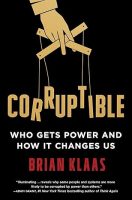
Corruptible
Brian Klass
Does power corrupt, or do corrupt individuals seek power? Are tyrants born or shaped by circumstances? Do unethical actions by entrepreneurs and law enforcers stem from flawed systems or personal failings? And how would you handle power—would you remain virtuous or succumb to greed and vengeance?
Corruptible explores these questions through over 500 interviews with global leaders, from presidents to dictators, uncovering insights like how facial features influence leader selection, why narcissists earn more, and the hidden benefits of being second-in-command. Blending historical and social science examples, it reveals surprising stories: a ski instructor who ruled Iraq, America’s worst bioterrorist, and how chimpanzees’ inability to play baseball sheds light on human hierarchies. This deeply researched book underscores a critical lesson: when psychopaths expose their nature, institutions must respond decisively and without mercy
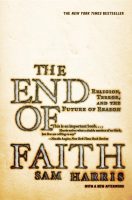
The End of Faith
Sam Harris
In The End of Faith, Sam Harris delivers a startling analysis of the clash between reason and religion in the modern world. He offers a vivid, historical tour of our willingness to suspend reason in favor of religious beliefs―even when these beliefs inspire the worst human atrocities. While warning against the encroachment of organized religion into world politics, Harris draws on insights from neuroscience, philosophy, and Eastern mysticism to deliver a call for a truly modern foundation for ethics and spirituality that is both secular and humanistic. Winner of the 2005 PEN/Martha Albrand Award for Nonfiction.
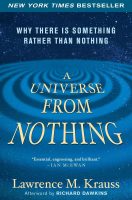
A Universe From Nothing
Lawrence Krauss
One of the few prominent scientists today to have crossed the chasm between science and popular culture, Krauss describes the staggeringly beautiful experimental observations and mind-bending new theories that demonstrate not only can something arise from nothing, something will always arise from nothing. With a new preface about the significance of the discovery of the Higgs particle, A Universe from Nothing uses Krauss’s characteristic wry humor and wonderfully clear explanations to take us back to the beginning of the beginning, presenting the most recent evidence for how our universe evolved—and the implications for how it’s going to end.
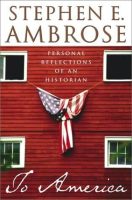
To America
Stephen E. Ambrose
In To America, Stephen E. Ambrose reflects on his career as a historian, exploring the essence of the historian’s craft while celebrating and critiquing America’s journey. He highlights the nation’s resilience, acknowledges its failures—such as racism, the mistreatment of Native Americans, and the Vietnam War—and addresses the contradictions of founders like Washington and Jefferson. Ambrose recounts key historical moments, from Andrew Jackson’s improbable victory in the War of 1812 to Lewis and Clark’s expedition, the transcontinental railroad, and Ulysses S. Grant’s misunderstood presidency. He examines shifts in power under Theodore Roosevelt, World War II’s triumph, and movements for women’s and civil rights. Ambrose also contrasts the leadership of Eisenhower, Kennedy, Nixon, and Johnson, while emphasizing the enduring American spirit. Ultimately, he celebrates history as the study of people and their actions, making this work a compelling exploration of patriotism and storytelling.
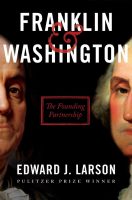
Franklin & Washington
Edward J. Larson
“Larson’s elegantly written dual biography reveals that the partnership of Franklin and Washington was indispensable to the success of the Revolution.” —Gordon S. Wood
From the Pulitzer Prize-winning historian comes a masterful, first-of-its-kind dual biography of Benjamin Franklin and George Washington, illuminating their partnership’s enduring importance.
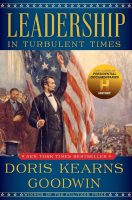
Lidership in Turbulent Times
Doris Kearns Goodwin
From Pulitzer Prize–winning author and esteemed presidential historian Doris Kearns Goodwin, an invaluable guide to the development and exercise of leadership from Abraham Lincoln, Theodore Roosevelt, Lyndon B. Johnson, and Franklin D. Roosevelt.
The inspiration for the multipart HISTORY Channel series Abraham Lincoln and Theodore Roosevelt.
“After five decades of magisterial output, Doris Kearns Goodwin leads the league of presidential historians” (USA TODAY). In her “inspiring” (The Christian Science Monitor) Leadership, Doris Kearns Goodwin draws upon the four presidents she has studied most closely—Abraham Lincoln, Theodore Roosevelt, Franklin D. Roosevelt, and Lyndon B. Johnson (in civil rights)—to show how they recognized leadership qualities within themselves and were recognized as leaders by others. By looking back to their first entries into public life, we encounter them at a time when their paths were filled with confusion, fear, and hope.
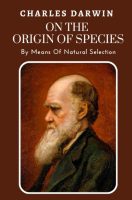
On The Origins of Species
Charles Darwin
In 1859, British biologist Charles Darwin released his revolutionary scientific treatise ‘On the Origin of Species by Means of Natural Selection’ in England. In Darwin’s hypothesis, a process he named “natural selection” is responsible for the steady evolution of life. A species’ general genetic makeup is influenced by natural selection, where animals with genetic variations that are better suited to their environment tend to have more offspring than organisms of the same species that lack the variation. For the most of human history, the general consensus was that the universe was formed in a single instant. That was until scientists began to question it, and Charles Darwin’s book revolutionized our understanding of the process of evolution.
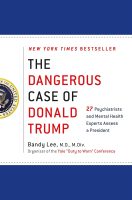
The Dangerous Case of Donald Trump
Brandy Lee, M.D., M.Div.
In THE DANGEROUS CASE OF DONALD TRUMP, twenty-seven psychiatrists, psychologists, and other mental health experts argue that, in Mr. Trump’s case, their moral and civic “duty to warn” America supersedes professional neutrality. They then explore Trump’s symptoms and potentially relevant diagnoses to find a complex, if also dangerously mad, man.
Philip Zimbardo and Rosemary Sword, for instance, explain Trump’s impulsivity in terms of “unbridled and extreme present hedonism.” Craig Malkin writes on pathological narcissism and politics as a lethal mix. Gail Sheehy, on a lack of trust that exceeds paranoia. Lance Dodes, on sociopathy. Robert Jay Lifton, on the “malignant normality” that can set in everyday life if psychiatrists do not speak up.
His madness is catching, too. From the trauma people have experienced under the Trump administration to the cult-like characteristics of his followers, he has created unprecedented mental health consequences across our nation and beyond.
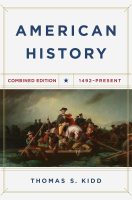
American History
Thomas S. Kidd
In this combined edition, the full content of volumes 1 and 2 of Thomas Kidd’s American History are brought together in a single, accessible textbook. This sweeping narrative spans the full scope of American history from the first Native American societies to the political and cultural struggles of contemporary times. In clear, readable prose, and with attention to well-known and more obscure figures from American history, Kidd gives a robust account of the events, people, and ideas that gave shape to our nation.
Students will come away from American History well-informed, and better prepared to wrestle with the political and cultural changes that have dramatically transformed contemporary American life.
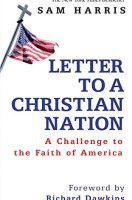
Letter to a Christian Nation
Sam Harris
Humanity has had a long fascination with blood sacrifice. In fact, it has been by no means uncommon for a child to be born into this world only to be patiently and lovingly reared by religious maniacs, who believe that the best way to keep the sun on its course or to ensure a rich harvest is to lead him by tender hand into a field or to a mountaintop and bury, butcher, or burn him alive as offering to an invisible God. The notion that Jesus Christ died for our sins and that his death constitutes a successful propitiation of a “loving” God is a direct and undisguised inheritance of the superstitious bloodletting that has plagued bewildered people throughout history. . .
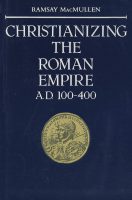
Christianizing the Roman Empire: A.D. 100-400
Sam Harris
How did the early Christian church manage to win its dominant place in the Roman world? In his newest book, an eminent historian of ancient Rome examines this question from a secular―rather than an ecclesiastical―viewpoint. MacMullen’s provocative conclusion is that mass conversions to Christianity were based more on the appeal of miracle or the opportunity for worldly advantages than simply on a “rising tide of Christian piety.”
“Provocative to the Christian religious scholar and the nonreligious historian alike. . . . MacMullen’s style is lucid, and the story of a period with its own innate interest is narrated with compelling feeling. . . . It is an important book, and highly recommended for the general reader of history as well as the Christian who wonders how the ‘Jesus movement’ came, by Constantine’s time, to be the church we know―Choice
“Written in a fresh and vigorous style, . . . [this book] offers an admirable survey of some major aspects of the history [of the early Christian church].”―Robert M. Grant, New York Times Book Review
“Gently provocative. . . . MacMullen has written an instructive and enjoyable book on a great theme.”―Henry Chadwick, Times Literary Supplement
“A carefully argued and well-written study.”―Jackson P. Hershbell, Library Journal.
A Note from Joe: I have been reading about this book, but I have not been able to read it, yet.
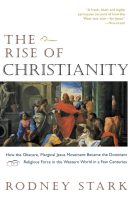
The Rise of Christianity: How the Obscure, Marginal Jesus Movement Became the Dominant Religious Force in the Western World in a Few Centuries
Rodney Stark
Rodney Stark’s “fresh, blunt, and highly persuasive account of how the West was won—for Jesus” (Newsweek)—a provocative report that challenges conventional wisdom and finds that Christianity’s astounding dominance of the Western world arose from its offer of a better, more secure way of life.
“Compelling reading” (Library Journal) that is sure to “generate spirited argument” (Publishers Weekly), this account of Christianity’s remarkable growth within the Roman Empire is the subject of much fanfare. “Anyone who has puzzled over Christianity’s rise to dominance … must read it.” says Yale University’s Wayne A. Meeks, for The Rise of Christianity makes a compelling case for startling conclusions.
Combining his expertise in social science with historical evidence, and his insight into contemporary religion’s appeal, Stark finds that early Christianity attracted the privileged rather than the poor, that most early converts were women or marginalized Jews—and ultimately “that Christianity was a success because it proved those who joined it with a more appealing, more assuring, happier, and perhaps longer life” (Andrew M. Greeley, University of Chicago).
A Note from Joe: I have been reading about this book, but I have not been able to read it, yet.
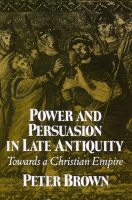
Power and Persuasion in Late Antiquity: Towards a Christian Empire (Curti Lecture Series)
Peter Brown
Peter Brown, perhaps the greatest living authority on Mediterranean civilization in late antiquity, traces the growing power of Christian bishops as they wrested influence from philosophers, who had traditionally advised the rulers of Graeco-Roman society. In the new “Christian empire,” the ancient bonds of citizen to citizen and of each city to its benefactors were replaced by a common Christianity and common loyalty to a distant, Christian autocrat. This transformation of the Roman empire from an ancient to a medieval society, he argues, is among the most far-reaching consequences of the rise of Christianity.
A Note from Joe: I have been reading about this book, but I have not been able to read it, yet.
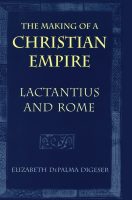
The Making of a Christian Empire: Lactantius and Rome
Elizabeth DePalma Digesereter
The work of the Christian scholar Lactantius provides an ideal lens through which to study how Rome became a Christian empire. Elizabeth DePalma Digeser shows how Lactantius’ Divine Institutes―seditious in its time―responded to the emperor Diocletian’s persecution and then became an important influence on Constantine the Great, Rome’s first Christian emperor.
The Making of a Christian Empire is the first full-length book to interpret the Divine Institutes as a historical source. Exploring Lactantius’ use of theology, philosophy, and rhetorical techniques, Digeser perceives the Divine Institutes as a sophisticated proposal for a monotheistic state that intimately connected the religious policies of Diocletian and Constantine, both of whom used religion to fortify and unite the Roman Empire. For Digeser, Lactantius’ writings justify Constantine’s own attitude of tolerance toward pagans and casts light upon other puzzling features of Constantine’s religious policy. Her book contributes importantly to an understanding of the political and religious tensions of the early fourth century.
A Note from Joe: I have been reading about this book, but I have not been able to read it, yet.
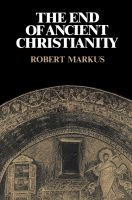
The End of Ancient Christian
Robert A. Markus
This study is concerned with one, central historical problem: the nature of the changes that transformed the intellectual and spiritual horizons of the Christian world from its establishment in the fourth century to the end of the sixth. Why, for example, were the assumptions, attitudes and traditions of Gregory the Great so markedly different from those of Augustine? The End of Ancient Christianity examines how Christians, who had formerly constituted a threatened and beleaguered minority, came to define their identity in a changed context of religious respectability in which their faith had become a source of privilege, prestige and power. Professor Markus reassesses the cult of the martyrs and the creation of schemes of sacred time and sacred space, and analyzes the appeal of asceticism and its impact on the Church at large. These changes form part of a fundamental transition, perhaps best described as the shift from “Ancient” toward “Medieval” forms of Christianity; from an older and more diverse secular culture towards a religious culture with a firm Biblical basis.
A Note from Joe: I have been reading about this book, but I have not been able to read it, yet.

